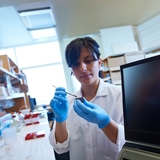Novel Therapeutics for Bleeding Disorders (NoT Bleeding) Program

The Novel Therapeutics for Bleeding Disorders (NoT Bleeding) Program at Children's Hospital of Philadelphia (CHOP) is known worldwide for combining expert care with life-changing research.
If your child has an inherited bleeding disorder, such as hemophilia, our team will develop a care plan tailored to your child's specific condition. We can help your family choose the best therapy for your child’s needs. We also have expertise in identifying and managing unclassified bleeding disorders.
We are pioneers in conducting clinical trials to test gene therapies for hemophilia A and B. Our goal is to develop new therapies for bleeding disorders and quickly and safely make these new therapies available to patients.
How we serve you
We will give your child the very best care. To do this, we have specialized treatment groups for children with bleeding disorders.

Why choose the Novel Therapeutics for Bleeding Disorders (NoT Bleeding) Program
The NoT Bleeding Program is co-led by a team of world-class experts who together have more than two decades of experience in gene therapy for hemophilia and in giving the highest possible care for patients with bleeding disorders. Some of the biggest breakthroughs in the treatment of bleeding disorders have happened right here.

Meet your team
Your child will be cared for by one of the most accomplished teams of bleeding disorder experts in the world. We make sure your child and every member of your family get the highest level of support.

Our research
Our researchers have made key discoveries for the development of gene therapy for hemophilia.

Novel Therapeutics for Bleeding Disorders (NoT Bleeding) Program resources
We have gathered resources to give you information and help you find answers to your questions.
Your donation changes lives
A gift of any size can help us make life-changing breakthroughs and advance our work for children everywhere.

